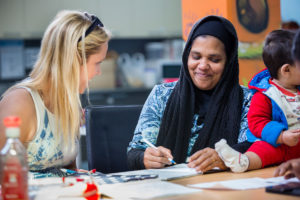Relationship has been central to Jesuit Social Services’ work over our more than 40 years.
Building trust and understanding is at the heart of our settlement work, which supports newly arrived people and families to make connections, links them in with services and programs, and ultimately helps them settle into life in Australia.
“Having access to practical assistance can often be taken for granted by those who have lived in Australia for a long time and speak English,” says Jesuit Social Services’ Support Worker Nicole Attard. “However those who are newly arrived can struggle to know where to turn.
Our settlement program is flexible, dynamic and innovative in the way it supports participants to maximise their resources, skills and chances of living a happy and meaningful life in a new country,” says Nicole.
The settlement program work spans individual casework, groups, workshops, information sessions and activities such as English Language Support Programs and a Homework Club, in which volunteer mentors assist primary and secondary students with their school work.
Participant Hawa arrived in Australia from Eritrea in 2014 and has settled in Melbourne with five of her children. She says the practical support provided by the settlement program has helped her family feel at home in Australia.
“Coming to Australia has been one of the greatest things that has happened to me and my family, and I am so happy to be a part of this organisation which helped me and my kids be in a good and safe environment,” she says.
“There have been challenges but with the help from the settlement program there is more hope in raising my children to achieve more, make a quality life and be great contributors to society.”
Nicole says the work is equally rewarding for staff members and volunteers, who get to support people in their journey to participating more fully in society.
“Even assisting a participant to connect electricity or other utilities, we are able to work together to build independence and empowerment,” she says.
“In every engagement there is opportunity to cultivate a positive experience for participants living in a new country.”







